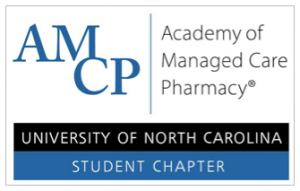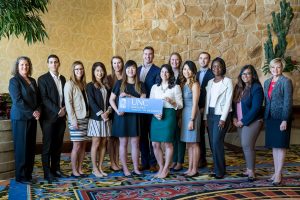
At UNC-ESOP, AMCP has become the pre-eminent student organization for pharmacy students interested in careers in managed care pharmacy, the biopharmaceutical industry, and system-level healthcare decision making. Interest in this area of pharmacy practice in the student body has grown significantly over recent years, as AMCP saw an almost 40% increase in membership the past few years, bringing them to over 120 members. UNC’s AMCP chapter is also nationally recognized – they produced the past two national champion teams in the AMCP Foundation P&T Competition!

Some of AMCP’s key events include:
P&T Competition – This is a cornerstone of AMCP’s fall semester offerings, and is a longitudinal event carried out by chapters across the country. The UNC AMCP chapter has collaborated with GSK to put together a 5-week educational bootcamp, complete with a syllabus and associated assignments, to prepare students for the competition. Teams of 4 work together over ~2 months to assemble submission materials and present them for a chance to win our UNC local competition. The winner of the local competition is then submitted for a chance compete at the national competition. UNC’s chapter happens to have produced the past two national champion teams!
Pharmacy Benefits & Managed Care Student Handbook – The UNC AMCP students are also involved in the writing, revising, and editing of their self-produced Pharmacy Benefits & Managed Care Student Handbook.
Annual Speed Networking Event – Every spring, AMCP gathers pharmacists working in life sciences/biotech, managed care, and other unique fields to mingle with current UNC PharmD students. Students and professionals alike get the chance to network with peers, generate career opportunities, and receive advice for their own professional development.
AMCP has also developed active collaborations with other organizations on campus to provide members maximum exposure to the beneficial events occurring on campus and in the area. One of these collaborations directly led to the creation of the Interprofessional Healthcare Case Competition, which brought together students from UNC’s PharmD, MBA, MD, and MPH programs.
AMCP at ESOP is led by Jefferson Pike (President, Class of 2021). Sit with Senate’s Clara Kim met with Jeff to learn more about AMCP and how it equips students to enter the field of managed care.
SwS: What motivated you to serve as the President of AMCP?
Jefferson Pike: Before starting pharmacy school, I knew I wanted to work in drug development. Interdisciplinary teams work together to design and validate new medicines. As the premier student organization covering non-traditional PharmD careers, AMCP was the perfect fit for me. On a weekly basis, the Academy hosts thought leaders in the pharmaceutical industry, managed care, pharmacy entrepreneurship and life science consulting. It provides many opportunities for members to play an active role, like our In-the-News roundtables where we discuss and debate current healthcare events and trends. And more than anything, I saw that the executive team has a passion for growing in their career development and leadership abilities.
SwS: Why did you decide to pursue a non-traditional career in pharmaceutical industry?
JP: When I look at some of the biggest trends in healthcare today, they all point toward integration. My concern with some of the more traditional roles is that we as pharmacists tend to get trapped in our own bubble of the healthcare space. Going into a non-traditional role means being exposed to many other perspectives – in industry, this means working alongside PhDs in biology, chemistry, psychology, and health economics. MBAs, MDs, MPHs – you name it! Working with such different perspectives allows us to view challenges more holistically, and problem-solve them in a more meaningful way.
When it comes to the pharmaceutical industry, there are pros and cons. Some pros include better long-term compensation and benefits, work/life balance, bigger-picture impact, and greater variety in day-to-day activities. Some cons are lack of direct patient interaction (unless you work in an area such as patient advocacy), and potentially less direct/more narrow utilization of your clinical pharmacotherapy training. Like any career path, it is important to carefully consider your strengths, what brings you the most fulfillment on a daily basis, and where your passions lie.
SwS: What is your favorite part about AMCP?
JP: Without a doubt, it is working with such a high caliber of people on the executive team. Everyone is passionate about their future career, takes true ownership over their responsibilities, and works hard to grow their knowledge and actively participate in our meetings. Our members are intellectually curious, and are always referring amazing contacts to come speak, or suggesting fun new programming we could try. There is this passion for non-traditional PharmD roles, and the member engagement energizes me like nothing else.
AMCP is core to my PharmD experience, and without it I know that I would emerge from UNC with different career interests, a much smaller network, and significantly less career readiness. At UNC, AMCP looks at the needs of its members, it takes the existing foundation of programming, and we just try to keep building and getting better. We know that there will always be more to know, a stronger skill-set to be had, and more connections to be made because our career interests are non-traditional and expand beyond the scope of the core curriculum. As AMCP’s members create, organize, and participate in those opportunities it also helps us develop as leaders and as future managed care pharmacists.
AMCP is also special because of the national presence that it has established in the professional world as a driving force for sweeping improvements in healthcare. AMCP’s conferences are filled with professionals from all kinds of backgrounds, many of whom are not PharmDs. Susan Cantrell, AMCP CEO, is a well-recognized advocate and leader in value-based healthcare. AMCP’s eDossier system is quite familiar to most pharmaceutical companies, and AMCP’s advocacy efforts in Washington D.C. have led to such things as the Pharmaceutical Information Exchange (PIE) Act and the Biologics and Biosimilars Collective Intelligence Consortium (BBCIC). By involving yourself in such an organization at an early stage, you are able to more clearly grasp the key issues in healthcare, and you begin to understand how we can collectively address these issues as a society and a healthcare system.
SwS: How would you define ‘managed care pharmacy’?
JP: Managed care pharmacy is, by definition, the practice of developing and applying evidence-based medication use strategies to enhance patient and population health outcomes while optimizing the use of healthcare resources. Managed care is so broad though, that everyone including pharmacies, hospital systems, health plans, pharmacy benefit managers, wholesalers, drug developers, government agencies and more all have to apply its principles in order to function optimally. All of those organizations need to answer the question: “what can we do to ensure that we and our patients get the most value out of the medications we pay for?” Much of the ambiguity and confusion around managed care pharmacy comes in when you put the definition in the context of the organization and the incentives that shape the priorities of those different organization types. For example, a health insurer wants to make sure that its members have access to the medications that their doctors write prescriptions for, but the insurer also has a budget, and it knows that there are many instances in which safer or more cost-effective options are available. This is a main reason why Prior Authorizations exist. From another perspective, a manufacturer wants to re-coup the huge investment that it made to get the drug to market. This happens by getting a lot of prescriptions written by doctors, but the company also wants to make sure that the population receiving its products is appropriate in order to maximize effectiveness and minimize adverse outcomes. This is why basically every (branded) therapy on the market has one or more corresponding Medical Science Liaisons working with prescribers in different regions of the country. These examples, and so many more, help ensure that the healthcare system extracts the most value possible when we fill prescriptions and take medications.
View other Sit with Senate Articles!
Back to Sit with Senate Home Page
-

Senate Spotlight: Libby Powell
Libby Powell is a current PY2 (Class of 2023) on our Chapel Hill campus. She is from Gaithersburg, MD and completed her B.S. in Immunology and Infectious Disease at The Pennsylvania State University (Penn State). She has served as the … Read more
-

Faculty Spotlight: Dean Angela Kashuba
Dean Angela Kashuba, B.Sc.Phm., Pharm.D., DABCP, FCP, is the first female dean of the UNC Eshelman School of Pharmacy. Dean Kashuba first joined the UNC-Chapel Hill faculty in 1997, went on to be named the John and Deborah McNeill, Jr. … Read more
-

Faculty Spotlight: Dr. Robert Shrewsbury
Dr. Robert Shrewsbury (RS), Ph.D., provided us some of his time to be interviewed by Sit with Senate’s committee member Megan Tran. Dr. Shrewsbury is an associate professor in the Practice Advancement and Clinical Education (PACE) department. He is one … Read more
-

Senate Spotlight: Jenna Caldwell
Jenna Caldwell is a current PY3 (c/o 2021) on our Asheville campus. She attended UNC-Charlotte for her undergraduate studies and earned her BA in chemistry with two minors in Biology and Psychology. Interestingly enough, she knew Peter Thao (https://faopharmacy.unc.edu/student-spotlight-peter-thao/) before … Read more
-

Senate Spotlight: Rachel Gilmore
Rachel Gilmore is a current PY3 (c/o 2021) on our Chapel Hill campus. From Princeton, NJ she completed her undergraduate studies at Georgia Institute of Technology (Georgia Tech) and earned her BS in Chemistry. If you have ever wondered about … Read more
